Secwépemc Nation
The Secwépemc Nation, whose name, Secwépemc, means the spread out people, or people of the spread out land, in their language, have a territory that spans approximately 180,000 square kilometers across south-central British Columbia. With over 30 historic communities across the territory, they are united by a common language, Secwepemctsín, with 3 distinct dialects. Their ancestral lands, known in their language as Secwepemcúl̓ecw, includes mountain ranges, grasslands, and includes significant sections of the Fraser, Thompson, and Columbia river valleys.
The Secwépemc Nation was chosen by the Next Steps team to rebuild their Indigenous legal orders because of the interest and support of leaders within the Nation that established a body of research over the past 16 years, including work in collaboration with the University of Victoria’s Indigenous Law Research Unit (ILRU).
Areas of research on Secwépemc Laws completed:
- Secwépemc Lands and Resources Report: 2015 Research directed by Shuswap Nation Tribal Council’s Elders Council, designed to examine traditional governance of lands and resource use.
- K̓wséltkten and Secwépemc-kt (2018-2023): to support rebuilding citizenship laws and governance.
- Secwépemc Laws of Stsmémelt and K̓wséltkten (2009-2024): Law developed based upon research and analysis designed to develop a nation-based, community driven approach to governing matters involving children and families.
The Next Steps – Secwépemc Legal Orders project is:
- A research project collectively led by Secwépemc for Secwépemc, in partnership with a dedicated team at the University of Victoria, Faculty of Law and investment from the Law Foundation of BC.
- A stepping stone designed to put Secwépemc ancestral knowledge back to work, empowering Secwépemc to solve the problems of today.
- Building capacity by sharing knowledge, creating a ripple effect into future generations of Secwépemc.
Next Steps – Secwépemc Law is about bringing Secwépemc people together to define themselves, on their own terms, and make those understandings accessible and known to each other and the broader world.
Associate Research Directors - Secwépemc Law
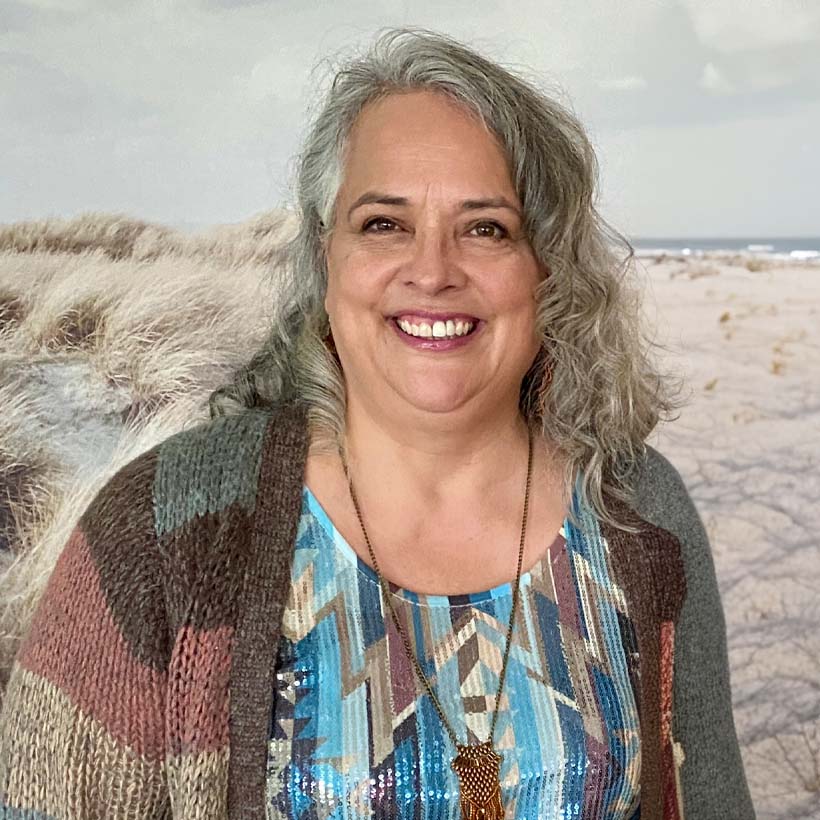
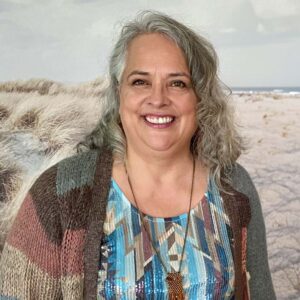
Racelle Kooy
Associate Research Director
Racelle Kooy, also known by her ancestral name Laloya, is a member of Samahquam First Nation with strong family ties to Stswecem’c Xgat’tem. Growing up in the lands now known as British Columbia, Laloya means “seagull” in her grandmother’s language, symbolizing her destined travels and connection to her ancestral land. During an exchange year in the French Riviera, Racelle interned at the City Hall of Cannes, witnessing a major reputation management crisis involving the mayor. This experience introduced her to speech writing and diplomacy under pressure. Straight from university, Racelle coordinated the live launch of APTN, the world’s first Indigenous broadcaster, celebrating the diversity of Indigenous people, their cultures and talents. In 2021, Racelle led communications for Tk’emlúps te Secwépemc’s Le Estcwicwe̓y̓, sharing the monumental news of the missing children of Kamloops Indian Residential School, garnering international media attention around historical mistreatment of children in residential schools. Her work is deeply rooted in her ancestral spiritual teachings, guiding her through significant international media events and respectful engagement with affected communities.
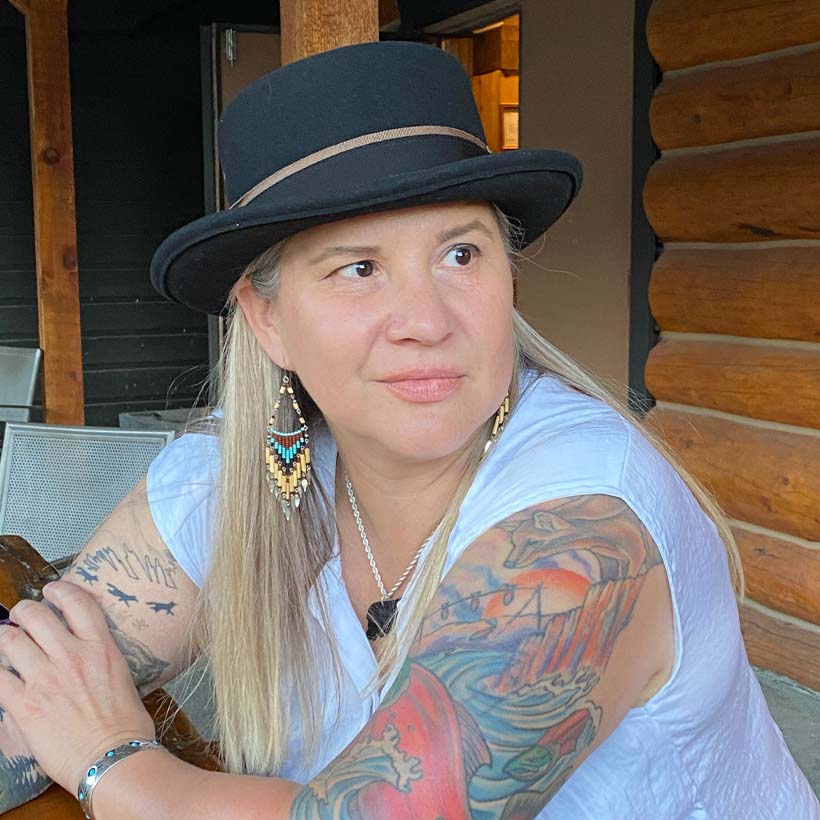
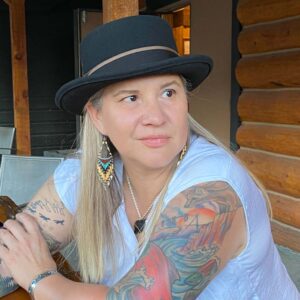
Sunny LeBourdais
Associate Research Director
Sunny LeBourdais is an elected Council member of the Pelltíq’t te Secwepemc (Whispering Pines / Clinton Band). She holds a M.Sc. from Simon Fraser University and B.Sc. and B.Ed. from TRU. Sunny has managed projects for the Okanagan, Ktunaxa, and Secwepemc Nations, including as Director of Transformation for the Qwelmínte-Secwepemc and Director of Governance at the Secwepemc Nation Building Initiative. Sunny coordinated the Stk’emlúpsemc te Secwépemc (SSN) Indigenous Impact Assessment for the KGHM Ajax Mine and served on the BC Minister’s Advisory Committee for the Environmental Assessment Act. She developed the TeamSku7pecen Knowledge Builders program, which was awarded a BC Reconciliation Award in 2024. Sunny integrates Indigenous and western knowledge systems to effect change while honouring Secwepemc laws and traditions. Sunny lives with her son Raven on the Whispering Pines ranch near Kamloops, BC where she enjoys horseback hunting and fishing in her traditional territory.
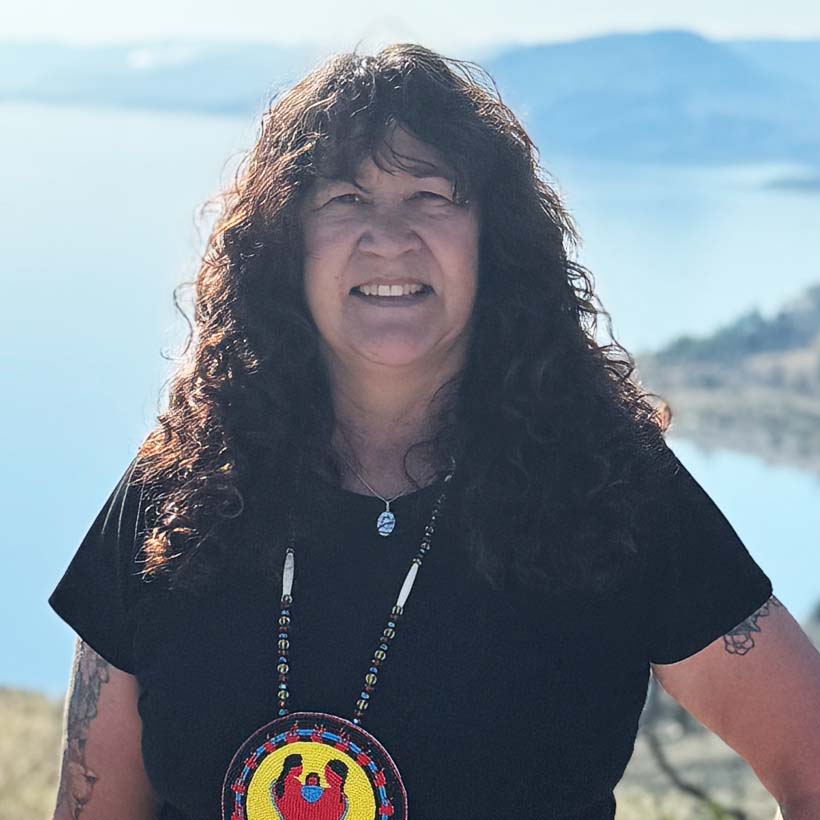
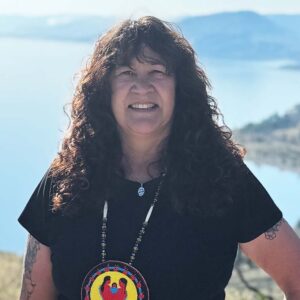
Bonnie Leonard
Associate Research Director
Bonnie Leonard graduated from the University of Victoria law school in 1996 and was called to the bar in 1997. She worked as legal counsel in Kamloops before serving a three-year term as Chief of the Kamloops Indian Band. In 2004, Bonnie joined the Shuswap Nation Tribal Council (SNTC) as Director of Aboriginal Rights and Title, becoming Tribal Director in 2010. She managed the Tribal Council’s administrative affairs and led Secwepemc law revitalization projects in partnership with the University of Victoria (UVic) Indigenous Law Research Unit (ILRU), including Stsmemelt (children and family) and lands and resources. In 2019, Bonnie became Strategic Advisor to National Chief Perry Bellegarde at the Assembly of First Nations, providing political and legal advice. She assumed her current role at UVic in 2025.
Research Team - Secwépemc Law
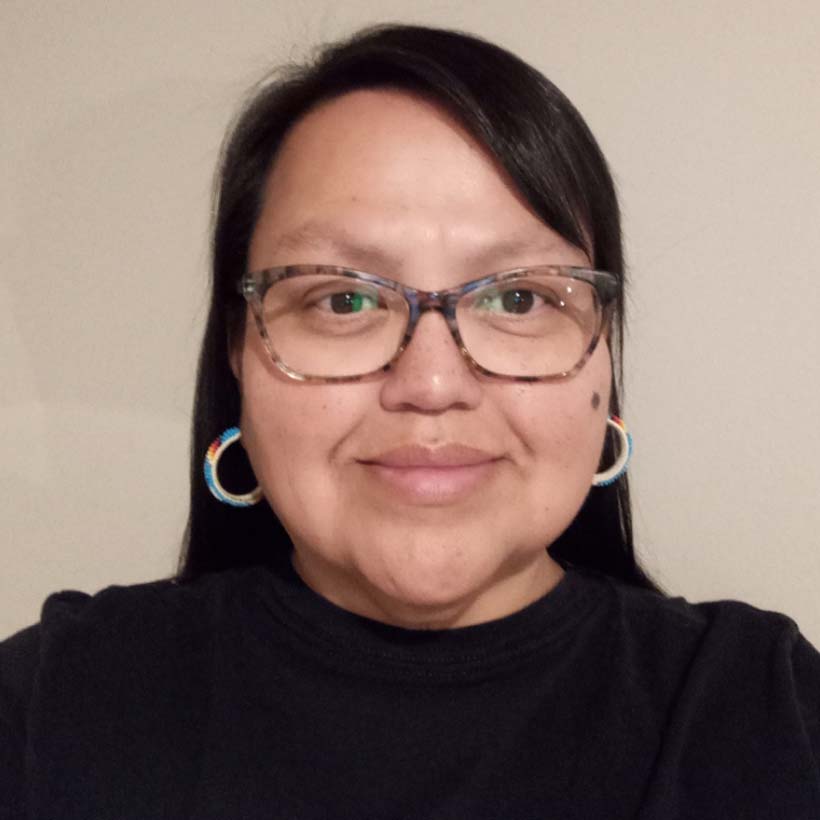
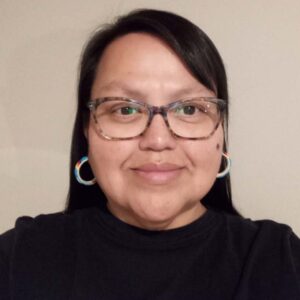
Tamara Archie
Community Researcher
Tamara Archie is Secwépemc from Stswecem’c Xget’tem First Nation. She gained a wealth of lived experience and Secwepemc knowledge growing up in community and learning from her parents, grand-parents, and Elders. In 2000, she was elected as a council member for her community, leading portfolios in Natural Resources, Housing and Social Development as it pertained to federal and provincial engagement. At the Shuswap Nation Tribal Council, she developed her experience regarding Secwépemc language and law where she organized events relating to the Indigenous Law Research Unit research for the Secwépemc: Lands and Resources Law research project. Tamara’s work with Qwelminte Secwepemc included leading the development of the Knowledge Builders Program based on the Skú7pecen telling. The program focused on the concept of ‘Walking on Two Legs’, upholding both western laws and science as well as Secwépemc Laws as laid out in Secwepemc oral histories and language.
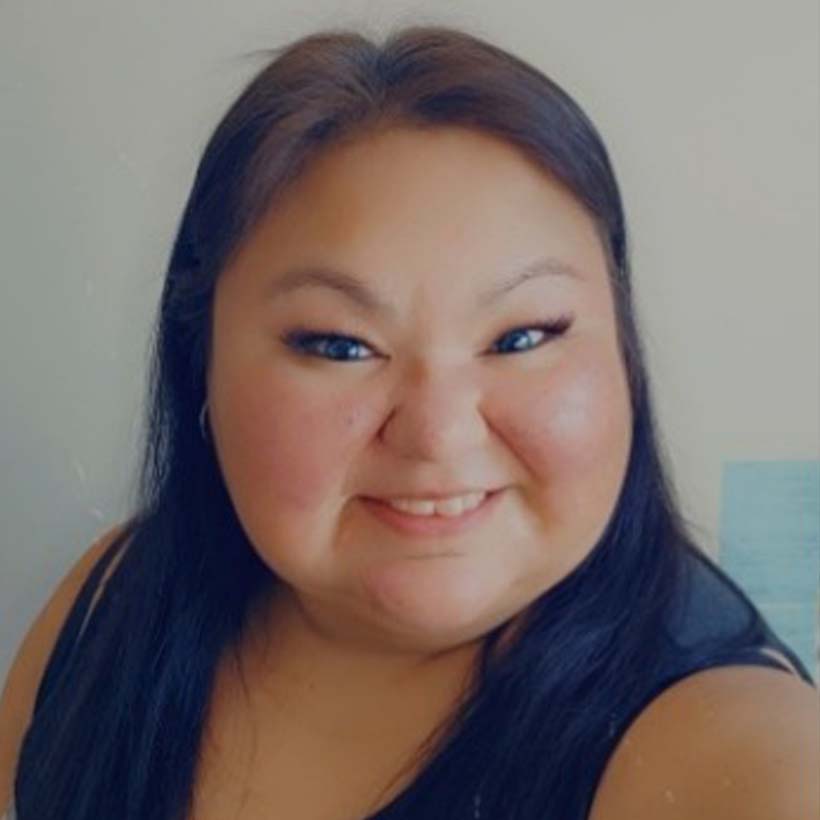
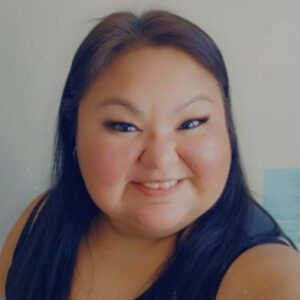
Lois Paul
Event Coordinator
Lois Paul is a member of Esket’emc First Nation. She brings a wealth of experience, education, and care to her position as Events Coordinator. She was honoured to serve in this capacity for the Shuswap Nation Tribal Council for multiple gatherings including a memorable one at Jasper National Park. She also served as the coordinator for the Kamloops Pow Wow and was honoured to help it grow. Lois assisted in the launch and establishment of the St Eugene Mission Resort as a go-to destination. Lois added to her toolkit of skills at the College of the Rockies as well as Thompson River University for events and convention management. She is delighted to reside in Secwepemcúl_̓ecw with her husband and two girls.
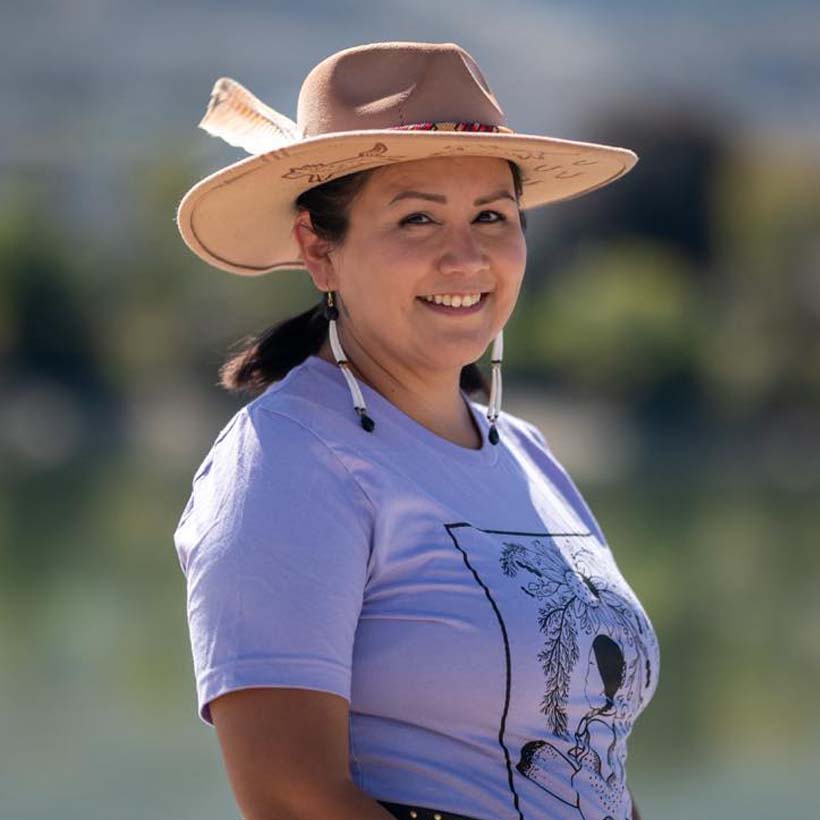
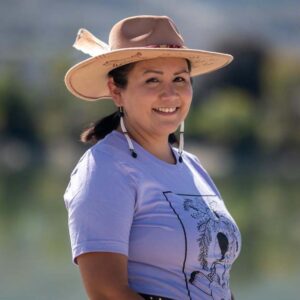
Julianne Rae Peters
Community Researcher
Julianne Rae Peters is from Canim Lake in Secwépemc Territory. Her maternal grandparents are the late Ray (Raphael Peters) and Antoinette Archie, and her paternal grandparents are the late Freddy Christopher and late Mary Anne (Emile) Christopher. She is a student in the Indigenous Languages and Linguistics Master’s Program at Simon Fraser University, set to graduate in 2026. She holds her Indigenous Languages Certificate and Diploma. Julianne’s first language mentors are her kikyé7e, Antoinette and Elsie Archie, Tsq_̓e_̓scnem_̓c, and has worked with several Secwepemctsín Elders throughout Secwepemcúl_̓ecw. Julianne’s skillsets include transcribing and translating the language. She has helped transcribe the Secwepemctsín in the Tsq_̓éscnem_̓c “Kíkwe Law”, Canim Lake’s Child & Family Jurisdiction Law. Julianne has been the bilingual MC for the Northern Secwépemc te Qelmúcw Treaty’s “Citizen’s Assembly” in 2022 & 2023. She has also performed Secwepemctsín songs for various events, such as the BC Memorial Cup and First Nations Blazers Night. Julianne’s goals are to continue working in Secwépemc Law, and to create resources for parents and caregivers to nurture their children’s language development.
Connect With Us
We welcome inquiries, collaborations, and conversations from communities, researchers, students, and organizations interested in Indigenous legal revitalization.